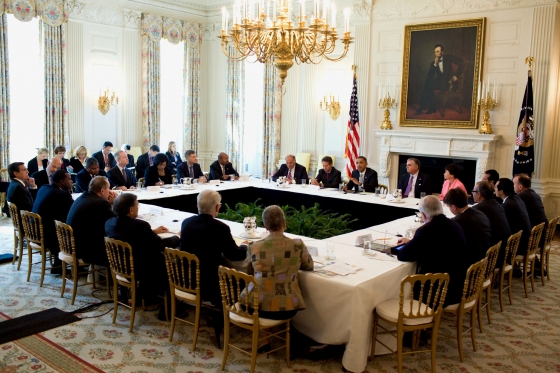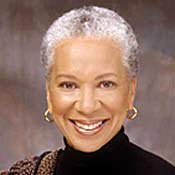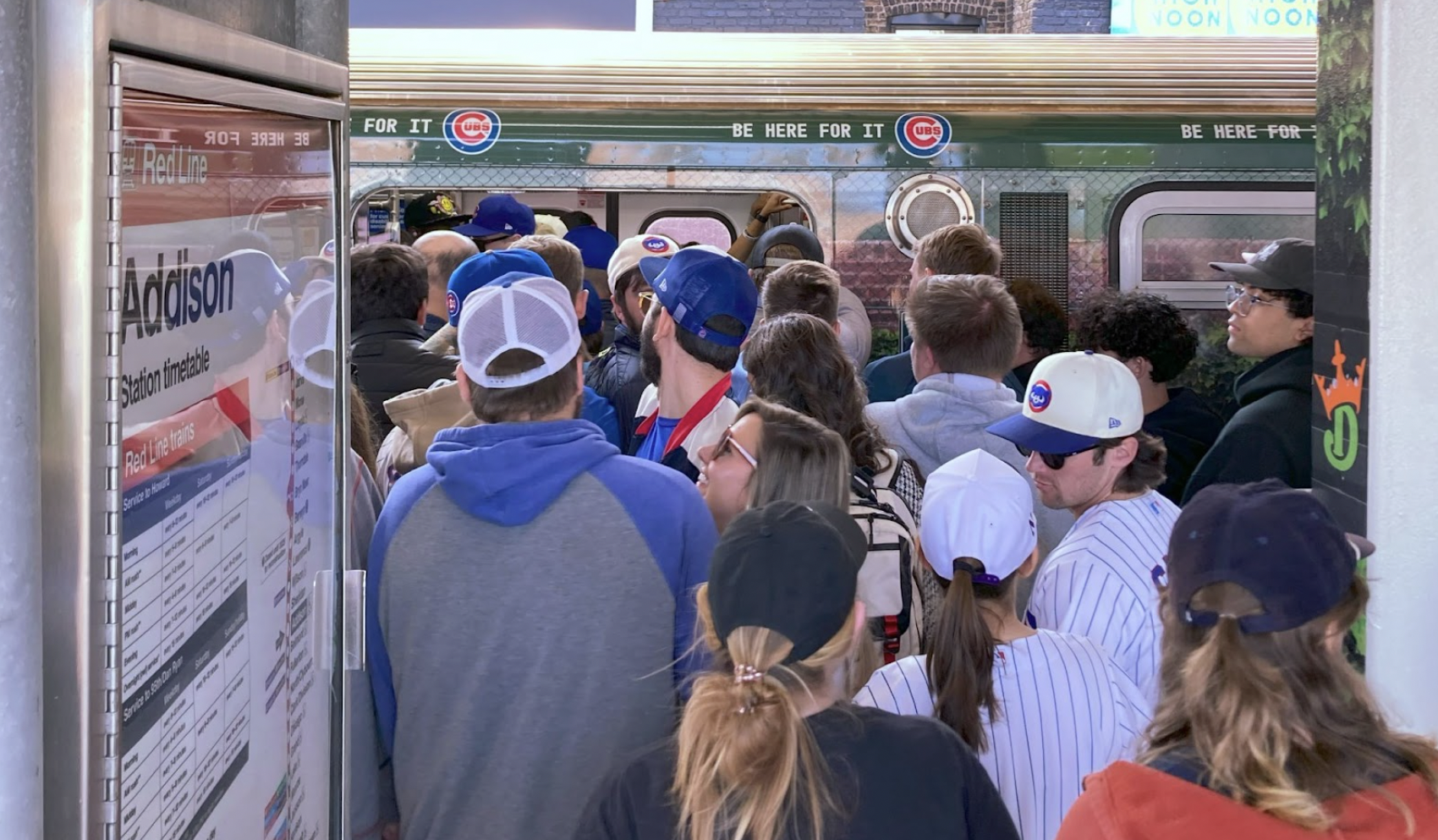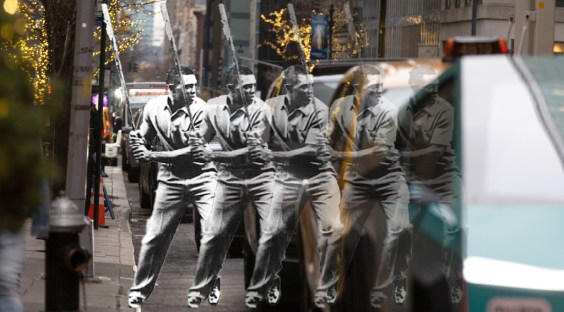
On Monday, President Obama talked infrastructure with two governors, eight mayors, four former transportation secretaries (and the current one), two labor leaders – and one public interest advocate. That advocate was Angela Glover Blackwell, founder of the think tank PolicyLink and chair of the Transportation for America Equity Caucus, which launched last week. The roundtable discussed the president's $50 billion infrastructure proposal, which is galvanizing transportation reformers as the contours come into sharper focus.
Blackwell spoke to Streetsblog about her meeting with the president, why transportation matters for social equity, and how people can help make the most of the current opportunity to reform national transportation policy.
Streetsblog: What was it like meeting with the president?
Blackwell: It was wonderful to be in a meeting with the president and the Treasury secretary and governors and mayors from around the country talking about infrastructure, with an emphasis on transportation. We’ve been focused on it for years, and it was encouraging to see it getting that level of attention and to see the President of the United States take an interest in transportation.
But I felt I had a tremendous responsibility to lift up the voices of low-income people and people of color and the communities where they live. It’s easy to talk about transportation and not talk about poverty, or the severe unemployment among Latinos and African Americans, those hit first and worst by this recession. I felt on my shoulders the responsibility to express that this has to be done in a way that impacts those who need it most. And the others there really heard what I was saying. Several referred back to what I had said, which was that transportation is a lifeline to opportunity in this country, and it’s way too important to leave to transportation professionals.
I also thought it was very important that at the top of the conversation, when the president came in, he turned to Governor Rendell and me to frame the conversation. He showed a lot of interest in talking about equity and inclusion.
SB: Set the scene for us. How long was the meeting? Did President Obama talk more or listen more?
AGB: We started the meeting at 9:30 with [Treasury] Secretary [Tim] Geithner and [Transportation] Secretary [Ray] LaHood, talking about the two reports. That lasted till about 10:00 or 10:15, when the president came in, and then we met until 11:15. So we were with the president for a good hour.
The president was mostly listening. He made opening comments about the importance of the issue, but he was very much in the mode of hearing from others about transportation, and about the $50 billion proposal.
SB: You talk about the importance of inclusivity and equity in the design of the transportation plan. These aren’t issues that everyone thinks about when they think of transportation. How does this issue affect the communities you represent?
AGB: The bottom fifth of the population spends 42% of their income on transportation. Nearly 25 percent of African Americans are without a car, and almost as many Latinos. So public transportation is very important in these communities, and it is under severe threat right now in the nation. In 110 cities, or more, public transit routes are at risk, and these are the routes residents use to take their children to school, to go to work, to go shopping. In St. Louis, in Georgia, bus lines are being cut, and people are being cut off from being able to get to work.
So we need to be investing in public transportation more, and investing in roads and bridges less. Thirty-one percent more jobs are created through public transportation than building new roads and bridges. And repairing existing roads and bridges creates 16 percent more jobs than building new ones.
What we are seeing is that more money goes into capital, and not operations. Communities need resources to keep the bus lines running, they need enough operators moving these transportation systems and to provide the support we need.
That’s the link between transportation and equity. Not just any investment in transportation produces equity. Investing in public transportation, workforce training, and operations – these are important components of equity.
SB: You’ve highlighted the problems facing rural areas.
AGB: Often when we think about equity we think about urban areas, inner cities. But there is a lot of poverty in rural areas and in those areas, people can be so isolated. People think everyone in rural areas works in family farming and all they have to do is walk out the front door and they work right there in their own fields. But family farming has virtually disappeared. Most people are working in big box retail like Wal-mart, and they travel great distances to get to their jobs, or to buy fresh fruits and vegetables, or to get their children to school. We need bus lines there; we need creative programs that invest in carpooling like jitneys that we see in other countries.
SB: What’s your sense of why the president is pushing infrastructure investment now?
AGB: I can only speculate that infrastructure is a wonderful win-win-win for the nation. It gets the nation ready for the 21st century global economy. While the United States has been a leader in the global economy, it will not continue to be if we don’t invest in infrastructure. Infrastructure also provides good-paying jobs that will move people into the middle class and will train people for the infrastructure jobs of the 21st century. We needed more money for infrastructure than we got in the first ARRA. This is a wonderful way to get the economy started again.
SB: What about the politics of this moment?
AGB: I personally worry about the politics of this moment. I am absolutely perplexed by them. Historically, infrastructure has not divided people along party lines in this nation. It’s quite shocking to me that we would be teeing up for a political battle over infrastructure investment, but sadly, it appears that we are. Everything seems to be falling into that abyss these days. People think nothing government does can be important, meaningful, or effective.
SB: President Obama is calling for a lame-duck push on the $50 billion proposal. Do you think that could happen?
AGB: I hope so.
SB: How can people who care about equity help influence this process?
AGB: On the $50 billion, get in touch with your congressional representatives and senators right away, saying how important it is to move this $50 billion into infrastructure, and pay attention to equity. Tell them to invest in public transportation and job training, especially in our hardest hit communities, making sure people are getting jobs who need them.






